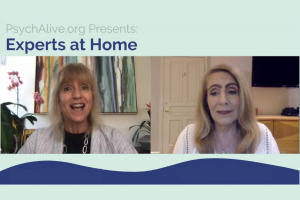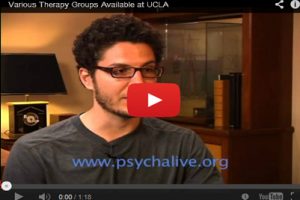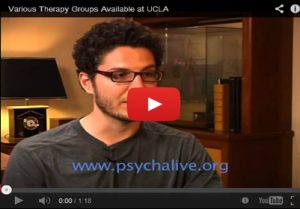Common Psychological Issues University Students Seek to Address: Interview with Dr. Daniel Zamir
Dr. Daniel Zamir draws upon his experience as a Student Counselor at UCLA to discuss common concerns of university students, including academic stress, issues regarding sexual identity, being the first family member to go to college, and finding the energy and focus to enjoy the full experience of college.
TYPICAL ISSUES UNIVERSITY STUDENTS SEEK TO ADDRESS
The following transcript contains part of an exclusive interview with the Editor of PsychAlive and Dr. Daniel Zamir.
Editor PA: We want to create a PsychAlive Campus page and we’re interested in the issues that college students typically have while they’re going to college. So we figured, since you work at the Counseling Center at UCLA, you probably have a pretty good idea of what they are. So I was wondering if there are some key issues that come up for students.
Dr. Daniel Zamir: Sure. So I guess I wish there were a couple of issues that people come in that I could spell out easily but I would say that, really, there’s a huge diversity of things that people come into the Counseling Center for, which I think makes it really interesting to work there because you’re seeing all sorts of different things. But in terms of that question, I guess certain things are maybe more prevalent in college students or there are some kind of themes that I’ve seen. So there’re a lot of people coming in for help regarding body image issues and eating disorders. As you would kind of imagine, there’s a lot of pressure on, I think especially young people today are getting more pressure about the way they’re supposed to look. So that’s something that we see a lot of and I’ve lead groups for people with eating disorders there.
There’s a huge amount, at UCLA, there’s a huge amount of anxiety. Some related to academic stress. So this is a very highly intelligent group of people who have been pressed into a very, very challenging academic environment with only other extremely intelligent people. And so a lot of people have a lot of academic anxiety around not standing out anymore. These are people who stood out in elementary school and were maybe skipped grades and were maybe in accelerated programs. In high school, they were valedictorians or at the top of their class and then got into UCLA. And with the undergrads, to some extent but definitely with the grad students especially, they’re kind of in this increasingly challenging academic group of only the elite of the elite of the elite. And it’s really, I guess, anxiety provoking when you’re kind of at the top 1-5 % in intelligence and suddenly, you’re somewhere in the middle, and that really freaks people out. Suddenly, it’s a lot harder to get all A’s. So I guess we have a lot of people coming in who are experiencing some sort of academic difficulty and really, it’s kind of just a relative academic difficulty most of the time. So that’s a couple of things.
There’re also a lot of people dealing with identity development of different sorts. So I think it’s a really interesting age to be talking to people at because, it’s, often times, it’s their first time, especially for the undergrads, the first time maybe living on their own. And there’s a lot of kind of figuring out who they are as people in the world in terms of sexuality and how they live their lives and learning to kind of take care of themselves for the first time separate from their parents. And so there’s a lot of questions that arise kind of figuring out what they really believe – sometimes it’s separate or very different from how they were raised and that’s something that can be really challenging for people.
But really, across the board we see all sorts of issues. So just thinking of like the age range for college, you think, I guess this is more traditional students and obviously, there’s a lot of people that fall outside of this, but maybe 18 to 25 or something. And also, it’s kind of the first stage of onset for a lot of different, more severe psychological disorders and things like bipolar and schizophrenia. Sometimes people are having their first psychotic break, you know, as they’re also starting to live on their own for the first time and that can be extremely difficult.
ADDRESSING ISSUES REGARDING SEXUAL IDENTITY
The following transcript contains part of an exclusive interview with the Editor of PsychAlive and Dr. Daniel Zamir.
Editor PA: In terms of, well, if you just take like one of the areas you were just talking about in terms of identity, how do you advise or how do you talk to somebody who is coming to you with questions about their identity or wrestling with those types of issues?
Dr. Daniel Zamir: I think the first thing I do is really just listen deeply and really try to understand them in their context. So, you know, their upbringing, their, you know, cultural and ethnic identity context — who they are in relationships, and how they make friends and make meaning in relationships — because that, especially, is so individual. And I have a lot of people who come in and just being a therapist, I think provides this tremendous power because people come in and they have this idea that, “You’re someone who I’m really supposed to tell everything to.” And sometimes, things they’ve never even acknowledged themselves, which is really incredible.
So things relating to maybe sexual orientation, if that’s been really stigmatized in their family, or, it is stigmatized in our culture, I think, still. That people who are coming out as gay or lesbian sometimes a couple sessions in will kind of first acknowledge that to themselves and be able to say, you know, “I’ve always had this attraction to people of my same gen … you know, people of my same sex. And it’s something that I really didn’t want to be true.” And as we explore it further, it’s clear that they’ve kind of known this to some extent about themselves and that through acknowledging that to another person, they’ve been able to actually have the safety to explore that part of themselves.
Being the First Member of the Family to go to College
The following transcript contains part of an exclusive interview with the Editor of PsychAlive and Dr. Daniel Zamir.
Dr. Daniel Zamir: People who are the first person in their families to go to college, because you see a lot of students who that’s the case, and often, it’s students of color, ethnic minority students who, you know, are the first person in their family, but not only, obviously. And I think there’s a lot of pressure to, even more so than your average student, who’s already under tremendous pressure to succeed, and then also [in addition] to give back and inspire other people in the community to seek a similar path.
And there’s this idea like you’re really, first of all, really lucky and really privileged to have gone to college. But that means now that you need to do certain things in terms of taking care of people and in terms of kind of helping other people to get where you are. And I think, on the one hand, that’s a fantastic, like absolutely, like great for more people from these traditionally, from these communities who traditionally hadn’t had as much access to higher education, that that’s great to have more people inspiring young people to achieve.
But I think for the individual already carrying so much of just the difficulty of succeeding at UCLA, not having had maybe the role models or people who could kind of show them the path of like, “Here’s how you apply to college and here’s how you study for the SAT’s.” Like they had to figure a lot of this out for themselves and the people I’ve seen who kind of fit into this category are incredibly resourceful, extremely intelligent and more than willing usually to give back and really have this kind of ethic of wanting to pass this along and feeling really, really lucky and privileged. Even though it’s all been off their own hard work to kind of get where they are.
But I think it’s, I think it’s a lot to carry, that idea that, “I’m the first person who’s been given this opportunity and I need to make the most of it,” is a lot. And, in trying to balance that with growing up and making friendships and having relationships, I mean, it’s a tremendous amount. And some people are able to navigate that path beautifully and kind of meet all of those expectations and some people get overwhelmed and do things that are maybe more self-destructive to manage all of that pressure.
So whether it’s, you know, whether it’s something like avoiding their academic work because it just feels so stressful, and there’s such high expectations put on them that to turn anything in, feels not good enough. So that kind of perfectionism can come in or it can even actually be so stressful sometimes that people, use, you know, drugs and alcohol in excess in ways that get in the way of their studying. And really, what they’re doing is kind of self-medicating for this tremendous anxiety that they feel and this need to perform at a certain level and excel.
And so, really, when people come in to the Counseling Center who are, you know, their first time, that first generation college students, often what I’ll talk to them about, I mean, a lot of things that are specific to the individual person, but often I’ll try to tap into kind of what their values are and their own goals and helping them to kind of use their own internal motivation to achieve their own goals and kind of setting goals for them that are really realistic and that take into account who they are in their situation instead of just these ideas of, you know, “My parents said such and such, because I’m going to college, I need to do these things and I need to go into this specific career because that’s what makes the most money.” But I really try to tap into what, what’s inherently interesting to them, what’s their passion and what they want to do with this opportunity that they’ve been given.
I have a huge amount of respect for people who navigate that path because it’s just tremendously, tremendously difficult. And I think there’s things – I know I’ve taken for granted — and a lot of students who come from families of highly educated parents or even just extended family members who have been to college, that there’s so much that is offered that you don’t even know is there because you just assume it and maybe some of your friends have similar experiences. But this idea that somebody actually did show you how to apply for college, or took you maybe to visit different colleges or helped you study, even. If you have a parent who, or if no one in your family has never made it to that level, you really have to figure out these paths for yourself. And, as I said, I have a lot of respect for people who are able to make it to UCLA just off their own initiative because it’s a tremendous feat.
Finding the Energy to Focus; Enjoying the Experience of College
The following transcript contains part of an exclusive interview with the Editor of PsychAlive and Dr. Daniel Zamir.
Dr. Daniel Zamir: What I find is that people who really are struggling to complete and struggling to put in the work necessary to get by at UCLA is that they don’t have this compelling vision for what their future is going to look like. You know, I have people who come in who say, “I’m undeclared and I’m in my, you know, half way through my second year and, you know, I’m not getting the grades I want. It’s really difficult for me to kind of find the energy to focus.” And I’m like, “If you’re undeclared, you don’t know what you’re wanting to study, you don’t have this vision of what it’s going to look like at the end, it’s really difficult to put in the day-to-day work and not, you know, go out and do something more interesting in that moment.”
And so I really try to help people, if it’s going to the Career Counseling Center, like figure out at least some idea, it’s not that they need to know what they’re going to do. But at least some idea of something they might want to do or something they might want to learn about or some place they might want to be. Not like living in the future and not appreciating what they’re doing now.
But it’s a lot easier to put in the hard work and to enjoy being in college and being where they are if they have this idea of where it’s going to take them. Sometimes that makes all the difference. Because how can you work this hard day-to-day to where you’re losing sleep and, you know, studying for 12 hours at a time if you don’t know what you’re working towards?
Tags: sexual indentity, stress, students







Leave a Reply
You must be logged in to post a comment.